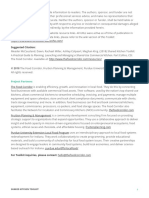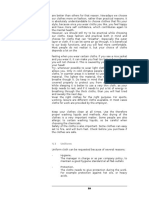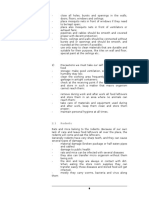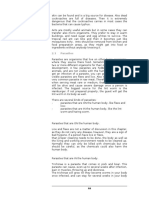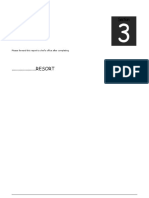0 ratings0% found this document useful (0 votes)
21 viewsTable Tops
Table Tops
Uploaded by
mohamed.mauroofThis document discusses uniforms and disease prevention for staff in a hospitality setting. It emphasizes that uniforms should be practical, easy to clean and maintain. Staff should only use uniforms for their intended purpose of protection and should not clean with them. Regular medical checkups are recommended to screen for diseases that can be transmitted even when asymptomatic. Staff should not work if sick themselves or exposed to illness at home, and those with wounds should also avoid food preparation.
Copyright:
© All Rights Reserved
Available Formats
Download as PDF, TXT or read online from Scribd
Table Tops
Table Tops
Uploaded by
mohamed.mauroof0 ratings0% found this document useful (0 votes)
21 views1 pageThis document discusses uniforms and disease prevention for staff in a hospitality setting. It emphasizes that uniforms should be practical, easy to clean and maintain. Staff should only use uniforms for their intended purpose of protection and should not clean with them. Regular medical checkups are recommended to screen for diseases that can be transmitted even when asymptomatic. Staff should not work if sick themselves or exposed to illness at home, and those with wounds should also avoid food preparation.
Original Title
table tops
Copyright
© © All Rights Reserved
Available Formats
PDF, TXT or read online from Scribd
Share this document
Did you find this document useful?
Is this content inappropriate?
This document discusses uniforms and disease prevention for staff in a hospitality setting. It emphasizes that uniforms should be practical, easy to clean and maintain. Staff should only use uniforms for their intended purpose of protection and should not clean with them. Regular medical checkups are recommended to screen for diseases that can be transmitted even when asymptomatic. Staff should not work if sick themselves or exposed to illness at home, and those with wounds should also avoid food preparation.
Copyright:
© All Rights Reserved
Available Formats
Download as PDF, TXT or read online from Scribd
Download as pdf or txt
0 ratings0% found this document useful (0 votes)
21 views1 pageTable Tops
Table Tops
Uploaded by
mohamed.mauroofThis document discusses uniforms and disease prevention for staff in a hospitality setting. It emphasizes that uniforms should be practical, easy to clean and maintain. Staff should only use uniforms for their intended purpose of protection and should not clean with them. Regular medical checkups are recommended to screen for diseases that can be transmitted even when asymptomatic. Staff should not work if sick themselves or exposed to illness at home, and those with wounds should also avoid food preparation.
Copyright:
© All Rights Reserved
Available Formats
Download as PDF, TXT or read online from Scribd
Download as pdf or txt
You are on page 1of 1
- Standards,
To recognize the company, section or department.
This is for guests very important, so they can see the
difference between the staff.
Uniforms are not just made for fun, they are practical. Some
points;
- Good and easy to clean
- Strong and good quality
- They must be light, fresh looking and able to
“breathe”
- Easy to iron
- White color (in case of kitchen uniform)
- Easy to put on and off (in case of emergency)
- Not have any parts hanging loose
- Non flammable
- Right size
That’s why you need to maintain your uniform while wearing
it. Use it only for its purpose, to protect your self. Do not use
your uniform to clean something, dry something or worse to
wipe your hands. Use your uniform only to protect your self,
and use the designated towels to do the cleaning.
Rules and regulations regarding the uniform are in the
employees handbook, so please refer to that chapter and
study them
4.4 Decease and preventions
People can carry decease causing micro organisms without
self being sick. They can transfer these dangerous bacteria
or other organisms to others and they can get sick.
At some medical checks they check also the waste of the
patient, just to see if there is any salmonella bacteria in
there. A medical check-up for kitchen staff should be done
once every two months. Even then it is still not easy to find
deceases, as somebody could get infected immediately after
the check while going home or to work.
The best thing is that if cooks are sick and have diarrhea not
to let them work. Also, if somebody at there home has
diarrhea, the staff needs to inform their supervisor about
that. It is very important!
Also people with wounds should not be working in the
kitchen to protect both, them and the guests. If you have a
wound, it is easy to get an infection when working with raw
29
You might also like
- Ex-Husband RegretDocument101 pagesEx-Husband RegretEllene Joyce Ginez Simpas0% (1)
- SOP Manual Food EstablishmentDocument15 pagesSOP Manual Food EstablishmentindrasucahyoNo ratings yet
- Module II Part 1Document41 pagesModule II Part 1Euchelle OdalNo ratings yet
- SOPDocument14 pagesSOPAnthony TaanNo ratings yet
- Personal HygienePPTDocument14 pagesPersonal HygienePPTDipti thathagar100% (1)
- FoodSafetyPlan SOPsDocument27 pagesFoodSafetyPlan SOPsWasimraja Nanjwani100% (1)
- Training On Good Manufacturing PracticesDocument26 pagesTraining On Good Manufacturing PracticesxxkooonxxNo ratings yet
- M3 PDFDocument8 pagesM3 PDFAbdalrahman TahaNo ratings yet
- Bread and Pastry Week 1Document48 pagesBread and Pastry Week 1Anjoe NecesarioNo ratings yet
- Prerequisite Processes (Ssop / GMP) : Personal HygieneDocument28 pagesPrerequisite Processes (Ssop / GMP) : Personal HygienelovesyndromeNo ratings yet
- Guide To Procedures and Measures For Safe Handling of FoodDocument22 pagesGuide To Procedures and Measures For Safe Handling of FoodLifelinesafety ConsultantsNo ratings yet
- Personal Hygiene and Fitness To Work: Safe MethodDocument2 pagesPersonal Hygiene and Fitness To Work: Safe MethodCarla Rosa0% (1)
- Employee HandBookDocument16 pagesEmployee HandBookPoulami DeNo ratings yet
- Safer FoodDocument58 pagesSafer Fooda.hamouda0707No ratings yet
- Infection (Ipc) 1Document22 pagesInfection (Ipc) 1TaylorNo ratings yet
- PrincyDocument9 pagesPrincyjorange1001No ratings yet
- RSOP1 Health and Personal HygieneDocument3 pagesRSOP1 Health and Personal HygieneSPHM HospitalityNo ratings yet
- Personal HygieneDocument6 pagesPersonal HygienelouisaNo ratings yet
- Unit 2 ModuleDocument6 pagesUnit 2 ModuleJeanette TumaliuanNo ratings yet
- Personal Hygiene Restaurant EmployeesDocument1 pagePersonal Hygiene Restaurant EmployeesZevallosKimberleyNo ratings yet
- Module 6 - Food Handlers Safety HygieneDocument14 pagesModule 6 - Food Handlers Safety HygienenozuwtfNo ratings yet
- GMP TrainingDocument41 pagesGMP Trainingfoodconsult1987No ratings yet
- Prerequisite Program (SSOP GMP)Document22 pagesPrerequisite Program (SSOP GMP)Looi Kok HuaNo ratings yet
- Culinary Terms Related To Sandwiches-Lesson3Document55 pagesCulinary Terms Related To Sandwiches-Lesson3John Rey Tresbe100% (1)
- Grooming and Hygiene For Restaurant StaffDocument5 pagesGrooming and Hygiene For Restaurant StaffShraddha VermaNo ratings yet
- (SOP) Standard Operating ProceduresDocument7 pages(SOP) Standard Operating ProceduresDimaree Dizon100% (1)
- Food Safety and Healthy Hygiene Practices Inthe Hotel and Hospitality IndustryDocument11 pagesFood Safety and Healthy Hygiene Practices Inthe Hotel and Hospitality IndustryRayyan PatelNo ratings yet
- Tesda Preparing Cake 2Document4 pagesTesda Preparing Cake 2Menkent Santisteban BarcelonNo ratings yet
- Personal Hygiene - Learn: Do Not Wear Jewellery and Watches While WorkingDocument16 pagesPersonal Hygiene - Learn: Do Not Wear Jewellery and Watches While WorkingnpallaresfNo ratings yet
- Food Handlers Safety and HygieneDocument76 pagesFood Handlers Safety and Hygienedevinegernale21No ratings yet
- Follow Workplace Hygiene Proceedures PowerpointDocument39 pagesFollow Workplace Hygiene Proceedures PowerpointNickela McMahonNo ratings yet
- RSOP1 Health and Personal HygieneDocument3 pagesRSOP1 Health and Personal Hygienepriyo_sikNo ratings yet
- Personal Hygiene TrainingDocument43 pagesPersonal Hygiene TrainingWathiq Ghareeb SalmanNo ratings yet
- Addressing Personal Hygiene As A Workplace Safety IssueDocument5 pagesAddressing Personal Hygiene As A Workplace Safety Issueikperha jomafuvweNo ratings yet
- Script For 1 Unit 3 HandwashingDocument4 pagesScript For 1 Unit 3 HandwashingolubobabukolaigeNo ratings yet
- BSHM 55 - Reaction PaperDocument2 pagesBSHM 55 - Reaction PaperYisu HimaaNo ratings yet
- The Safe of Food HandleeeeersDocument11 pagesThe Safe of Food HandleeeeersRoanne DavidNo ratings yet
- LSOP Personal Grooming CheckDocument3 pagesLSOP Personal Grooming Checkankitabhide707No ratings yet
- Bar Lab ModuleDocument60 pagesBar Lab Modulemhel20010No ratings yet
- Module 4 Personal Hygiene Course NotesDocument7 pagesModule 4 Personal Hygiene Course NotesIsengwe william WilliamNo ratings yet
- Knowledge Workbook 3Document24 pagesKnowledge Workbook 3Geovanni Rai Doropan HermanoNo ratings yet
- MDA SOPMnl06-09rev 290207 7Document15 pagesMDA SOPMnl06-09rev 290207 7Mohammad Abd Alrahim ShaarNo ratings yet
- Covid 19 Office Admin Health and Safety GuidanceDocument3 pagesCovid 19 Office Admin Health and Safety Guidanceganesh575No ratings yet
- Food and Beverage ServicesDocument7 pagesFood and Beverage ServicesERWIN LOSA�ESNo ratings yet
- Module II Part 1Document30 pagesModule II Part 1Gwen SalabsabNo ratings yet
- Personal Hygiene For Food HandlersDocument3 pagesPersonal Hygiene For Food Handlersputri augustyaNo ratings yet
- Code of EthicsDocument5 pagesCode of EthicsRonald GarciaNo ratings yet
- BPP G11 - Q2.4Document6 pagesBPP G11 - Q2.4Rio Krystal MolateNo ratings yet
- Personal Hygiene & Fitness To Work: Safe MethodDocument2 pagesPersonal Hygiene & Fitness To Work: Safe MethodAlghubariNo ratings yet
- GMP SopDocument5 pagesGMP SopHaider Ali100% (2)
- Chapter 2 - THE SAFE FOOD HANDLER PDFDocument83 pagesChapter 2 - THE SAFE FOOD HANDLER PDFGeraldine Roque ApiadoNo ratings yet
- BWH SOP and Safety For Food Production DepartmentDocument20 pagesBWH SOP and Safety For Food Production Departmentaidenfeedback09No ratings yet
- No 2 Personal Hygiene Uniform and Protective ClothingDocument4 pagesNo 2 Personal Hygiene Uniform and Protective ClothingKMCTCOLLEGEOFHOTELMANAGEMENT ANDCATERINGTECHNOLOGYNo ratings yet
- Hygiene: Johan Sebastian Lopez Alvarado Andres Felipe Baez Moreno Laura Milena Casallas VenegasDocument5 pagesHygiene: Johan Sebastian Lopez Alvarado Andres Felipe Baez Moreno Laura Milena Casallas VenegasAndres Felipe Baez MorenoNo ratings yet
- Making Your Own Hand Sanitizer and Disinfectant: DIY Guide With Easy Recipes to Make Your Homemade Hand Sanitizer and Disinfectant: Diy Homemade Tools, #2From EverandMaking Your Own Hand Sanitizer and Disinfectant: DIY Guide With Easy Recipes to Make Your Homemade Hand Sanitizer and Disinfectant: Diy Homemade Tools, #2No ratings yet
- Organic Cleaning Recipes 25 do-it-yourself Cleaning Recipes: Safe, Easy, and Practical for Everyday House Chores and SanitationFrom EverandOrganic Cleaning Recipes 25 do-it-yourself Cleaning Recipes: Safe, Easy, and Practical for Everyday House Chores and SanitationNo ratings yet
- Fire HeartDocument1 pageFire Heartmohamed.mauroofNo ratings yet
- Rachael Miller Ashley Colpaart Meghan King Dawn Meader MccauslandDocument1 pageRachael Miller Ashley Colpaart Meghan King Dawn Meader Mccauslandmohamed.mauroofNo ratings yet
- Soaking Time PDFDocument1 pageSoaking Time PDFmohamed.mauroofNo ratings yet
- Oike MasterDocument1 pageOike Mastermohamed.mauroofNo ratings yet
- Polop PDFDocument1 pagePolop PDFmohamed.mauroofNo ratings yet
- 4.1 Maintenance of The Body The SkinDocument1 page4.1 Maintenance of The Body The Skinmohamed.mauroofNo ratings yet
- Blank FigDocument1 pageBlank Figmohamed.mauroofNo ratings yet
- The Sensitive Skin of The HandsDocument1 pageThe Sensitive Skin of The Handsmohamed.mauroofNo ratings yet
- Trust OnnoDocument1 pageTrust Onnomohamed.mauroofNo ratings yet
- Bacteria That Causes Food SpoilageDocument1 pageBacteria That Causes Food Spoilagemohamed.mauroofNo ratings yet
- Stew BorwnDocument1 pageStew Borwnmohamed.mauroofNo ratings yet
- Quest Mike PDFDocument1 pageQuest Mike PDFmohamed.mauroofNo ratings yet
- Hay TimeDocument1 pageHay Timemohamed.mauroofNo ratings yet
- Dig DeeperDocument1 pageDig Deepermohamed.mauroofNo ratings yet
- Humidity / Water: Temperature Scale For BacteriaDocument1 pageHumidity / Water: Temperature Scale For Bacteriamohamed.mauroofNo ratings yet
- Temporry PottuDocument1 pageTemporry Pottumohamed.mauroofNo ratings yet
- PH Scale, From 0 To 14: OxygenDocument1 pagePH Scale, From 0 To 14: Oxygenmohamed.mauroofNo ratings yet
- Hygiene - Health - It Is Important To All of Us!!!!Document1 pageHygiene - Health - It Is Important To All of Us!!!!mohamed.mauroofNo ratings yet
- Prevention of Macro OrganismsDocument1 pagePrevention of Macro Organismsmohamed.mauroofNo ratings yet
- Wire SeamDocument1 pageWire Seammohamed.mauroofNo ratings yet
- MacronnDocument1 pageMacronnmohamed.mauroofNo ratings yet
- Done TrackDocument1 pageDone Trackmohamed.mauroofNo ratings yet
- 2.2 Insects and Spiders (And Spider Family)Document1 page2.2 Insects and Spiders (And Spider Family)mohamed.mauroofNo ratings yet
- Intro: "Health Is The Condition of Completely Physical, Mental and Social Well Being Without Illness or Weakness"Document1 pageIntro: "Health Is The Condition of Completely Physical, Mental and Social Well Being Without Illness or Weakness"mohamed.mauroofNo ratings yet
- C. Decease Causing Micro OrganismsDocument1 pageC. Decease Causing Micro Organismsmohamed.mauroofNo ratings yet
- At The Receiving AreaDocument1 pageAt The Receiving Areamohamed.mauroofNo ratings yet
- Refrigerators, PDFDocument1 pageRefrigerators, PDFmohamed.mauroofNo ratings yet
- From The Receiver, The Assigned PDFDocument1 pageFrom The Receiver, The Assigned PDFmohamed.mauroofNo ratings yet
- Water and Ice Sample Testing: Log Sheet NR: LOG002Document1 pageWater and Ice Sample Testing: Log Sheet NR: LOG002mohamed.mauroofNo ratings yet
- Product Temperatu Re Condition Comments: Log Sheet NR: LOG004Document1 pageProduct Temperatu Re Condition Comments: Log Sheet NR: LOG004mohamed.mauroofNo ratings yet






























































